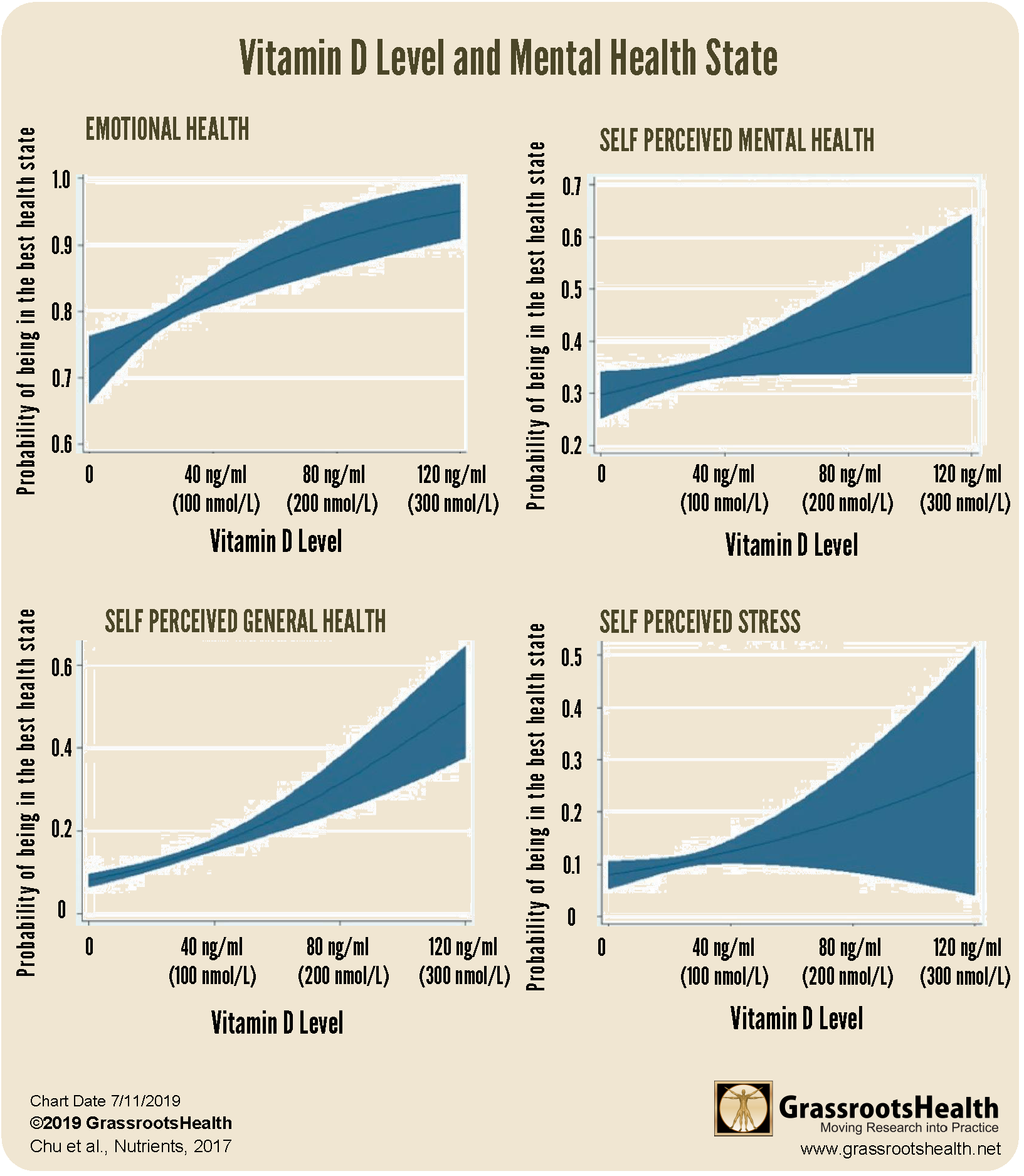Published on March 15, 2023
From cognitive to mental-emotional health, and including dementia, depression, anxiety, learning disorders, and other forms of cognitive and mental-emotional wellness, vitamin D has demonstrated beneficial effects
Key Points
- Higher concentrations of vitamin D in the brain were associated with a 25-33% significantly lower risk of dying with dementia or mild cognitive impairment, as well as better global cognitive function scores, a slower rate of cognitive decline, and better semantic and working memory before death
- Studies on vitamin D and mental health in particular have found that self-perceived measurements of mental and emotional wellness were positively associated with higher vitamin D levels
- There are several important ways that vitamin D works to improve brain functioning and reduce inflammation associated with cognitive and mental-emotional wellness

Happy Brain Week! This week (March 13-19, 2023) is a week to foster public enthusiasm and support for brain science.
Vitamin D has demonstrated important roles in brain function and mental health, including in the prevention and outcomes associated with mental-emotional, developmental, and cognitive dysfunction. How much of an impact does vitamin D have on the health of the brain? Is your brain getting enough?
Become your own ‘Citizen Scientist’ for brain health when you measure vitamin D and other important markers for brain health and participate in the D*action project.
Novel Study Links Vitamin D Levels in Brain Tissue to Cognitive Health
A novel study by Shea et al. examined concentrations of vitamin D and its metabolites in the brains of 290 deceased individuals, all of whom had previously participated in the Rush Memory and Aging Project, a study tracking risk factors for Alzheimer’s Disease and cognitive decline. The goal was to determine if there was an association between cognitive function prior to death and vitamin D levels found in the brain tissue.
The researchers discovered that the main form of vitamin D measured in brain tissue was 25(OH)D3, with higher concentrations of 25(OH)D3 associated with a 25-33% significantly lower risk of dying with dementia or mild cognitive impairment. Higher vitamin D levels in the brain were also related to better global cognitive function scores, a slower rate of cognitive decline, and better semantic and working memory before death.
Your Brain Needs Vitamin D
In recent years, cognitive health has been declining. 1 in every 3 seniors die with some form of dementia, and between the years 2000 and 2018, deaths due to Alzheimer’s increased by 146%. Mental-emotional health conditions are also very common, with an estimated 50% of Americans and Canadians diagnosed with a mental disorder at some point in their lifetime by middle age. The crisis has been even greater during the COVID-19 pandemic, with an observed increase in incidence of anxiety, depression, post-traumatic stress disorder and suicide.
Vitamin D has been biologically linked to emotional well-being, mood, cognition, and better mental health overall. One study on vitamin D and mental health in particular found that self-perceived measurements of mental and emotional wellness were positively associated with higher vitamin D levels.
How can vitamin D have such an influence on mental and emotional wellbeing?
Vitamin D functions in the brain and nervous system to:
- Stimulate neural cell growth and maturation during brain development
- Protect neural cells from damage due to oxidative stress and inflammation
- Play a role in the production of neurotransmitters (dopamine, serotonin, acetylcholine, catecholamine)
Mental Illness and Neurodegenerative Disease associated with low vitamin D include:
- Alzheimer’s Disease & Dementia
- Cognitive decline
- Parkinson’s disease
- Depression/Anxiety/Seasonal Affective Disorder
- Schizophrenia
- Autism & ADHD
- Migraines
- Multiple sclerosis
- Macular degeneration
The Connection Between Inflammation and Mental/Emotional Wellness
Managing chronic inflammation is extremely important for diseases associated with the brain and nervous system as multiple studies have found a direct correlation between high levels of inflammation and increased incidence of mental-emotional health problems. Previously, we reviewed a study assessing the effects of chronic inflammation on cognitive health, where higher levels of C-reactive protein (CRP) were related to an increase in cognitive decline. This is one of the reasons we have added the hsCRP test to our Cognitive Health Test Kit.
Order Your Cognitive Health Test Kit Now
Vitamin D is known to be associated with the risk of many of these inflammation-based diseases, with higher levels of vitamin D associated with lower levels of inflammatory markers and lower disease risk.
Other Important Co-Nutrients for Mental & Emotional Health
Don’t forget that vitamin D works along with other essential nutrients for our health. For our brain and nervous system, these include:
- Magnesium for stress/anxiety, ADHD and cognitive decline
- Omega-3s for cognitive impairment, anxiety/depression, SAD, and ADHD
- Probiotics for cognitive decline
- And many others…
For a summary of research on how these nutrients and several other markers can have a protective role on brain health and cognition, and can help decrease the risk of Alzheimer’s Disease and other forms of dementia, view the infographic and research summaries on this page.
Are You Getting Enough Vitamin D for Your Brain?
The only way to know is to test your levels! Testing versus blind supplementation is essential to know for sure if what you are taking is the right amount for you. Once you test your vitamin D (and other levels) to know where you are NOW, you can account for any upcoming changes in lifestyle over the coming months and adjust your intake to reach (or maintain) your targets.
 Having and maintaining healthy vitamin D levels and other nutrient levels can help improve your health now and for your future. Choose which additional nutrients to measure, such as your omega-3s and essential minerals including magnesium and zinc, by creating your custom home test kit today. Take steps to improve the status of each of these measurements to benefit your overall health. With measurement you can then determine how much is needed and steps to achieve your goals. You can also track your own intakes, symptoms and results to see what works best for YOU.
Having and maintaining healthy vitamin D levels and other nutrient levels can help improve your health now and for your future. Choose which additional nutrients to measure, such as your omega-3s and essential minerals including magnesium and zinc, by creating your custom home test kit today. Take steps to improve the status of each of these measurements to benefit your overall health. With measurement you can then determine how much is needed and steps to achieve your goals. You can also track your own intakes, symptoms and results to see what works best for YOU.
Enroll in D*action and Test Your Levels Today!






